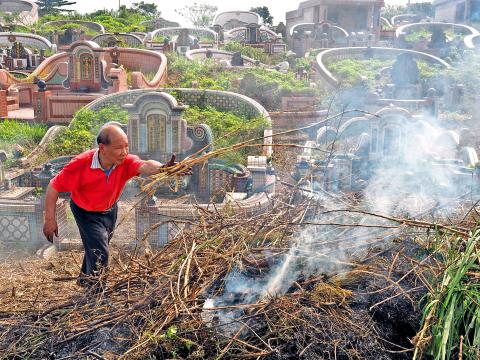More people are seeking eco-friendly burials, with 7 percent of people still using traditional burials, the Ministry of the Interior said yesterday, releasing its latest statistics on funereal preferences to coincide with Tomb Sweeping Day today.
The statistics show that 92.83 percent of people are cremated after they die.
Department of Civil Affairs division head Tang Keng-shen (唐根深) said an elderly woman in Tainan filed a request with the Tainan Danei Tree Burial Special Zone several months before she died to be buried there.

Photo: EPA
He said that the woman had not informed her family members of her decision, and it was not until after she was cremated that an employee at the crematorium told family members that she had registered for a natural burial.
He said her family members were at first surprised at her decision, but later obliged to her desire to “bond with nature.”
Due to limited space, most Taiwanese opt for cremation, and the number of people who say they would prefer to be buried has decreased sharply, Tang said.
Even though more people have embraced environmental burial methods, the number of people choosing natural burial make up just about 1 percent of the number of people cremated, he said.
Since the ministry began promoting eco-friendly burials in 2001, more than 16,000 people have adopted alternative burial methods, such as tree burials or flower burials, he added.
There are 29 natural burial sites at public cemeteries nationwide, including the Yongai Sanctuary and Jhengshan Sanctuary in Taipei; the Sanjhih Cherry Blossoms Sanctuary of Lives in New Taipei City; the Gueisih Sanctuary in Taichung; and the Tainan Danei Tree Burial Zone.
Aside from tree burial, the most popular among natural burial methods, Taipei, New Taipei City and Taoyuan together hold an annual sea burial ceremony, which has served more than 1,000 people since it was introduced in 2001.
Tree and flower burials involve placing ashes into biodegradable urns and burying them among groves at natural sites, Tang said.
Family members of the deceased do not burn ghost money at natural burial sites, instead mourning their loved ones in silence, he said.

A strong continental cold air mass is to bring pollutants to Taiwan from tomorrow, the Ministry of Environment said today, as it issued an “orange” air quality alert for most of the country. All of Taiwan except for Hualien and Taitung counties is to be under an “orange” air quality alert tomorrow, indicating air quality that is unhealthy for sensitive groups. In China, areas from Shandong to Shanghai have been enveloped in haze since Saturday, the ministry said in a news release. Yesterday, hourly concentrations of PM2.5 in these areas ranged from 65 to 160 micrograms per cubic meter (mg/m³), and pollutants were

Taiwan’s armed forces have established response protocols for a wide range of sudden contingencies, including the “Wan Chun Plan” to protect the head of state, the Ministry of Defense (MND) said today. After US President Donald Trump on Saturday launched a series of airstrikes in Venezuela and kidnapped Venezuelan President Nicolas Maduro, concerns have been raised as to whether China would launch a similar “decapitation strike” on Taiwan. The armed forces regularly coordinate with relevant agencies and practice drills to ensure preparedness for a wide range of scenarios, Vice Minister of National Defense Hsu Szu-chien (徐斯儉) told reporters before a

EVA Airways on Saturday said that it had suspended a pilot and opened an investigation after he allegedly lost his temper and punched the first officer several times as their plane was taxiing before takeoff at Los Angeles International Airport. According to a report published on Thursday by The Reporter, the incident occurred after the flight’s Malaysian first officer tried to warn the Taiwanese pilot, surnamed Wen (文), that he was taxiing faster than the speed limit of 30 knots (55.6kph). After alerting the pilot several times without response, the first officer manually applied the brakes in accordance with standard operating

NOT AN OPENING: Trump’s violation of international law does not affect China’s consideration in attacking Taiwan; Beijing lacks capability, not precedent, an official said Taiwanese officials see the US’ capture of the president of Venezuela as a powerful deterrent to Beijing’s aggression and a timely reminder of the US’ ability to defeat militaries equipped with Chinese-made weapons. The strikes that toppled Venezuelan President Nicolas Maduro signaled to authoritarian leaders, including Chinese President Xi Jinping (習近平), US President Donald Trump’s willingness to use military might for international affairs core to US interests, one senior official in Taipei’s security circle said. That reassured Taiwan, the person said. Taipei has also dismissed the idea that Trump’s apparent violation of international law could embolden Beijing, said the official, who was not